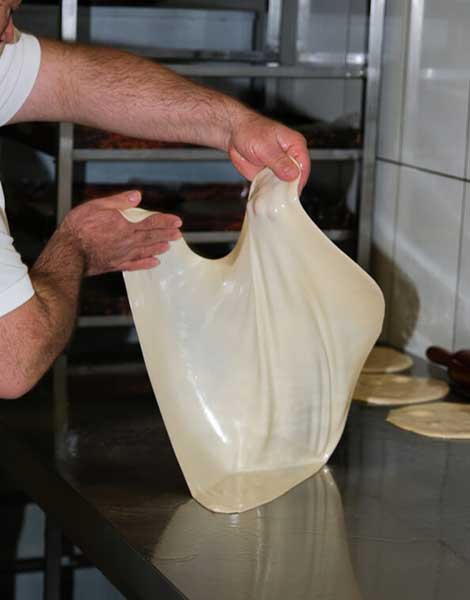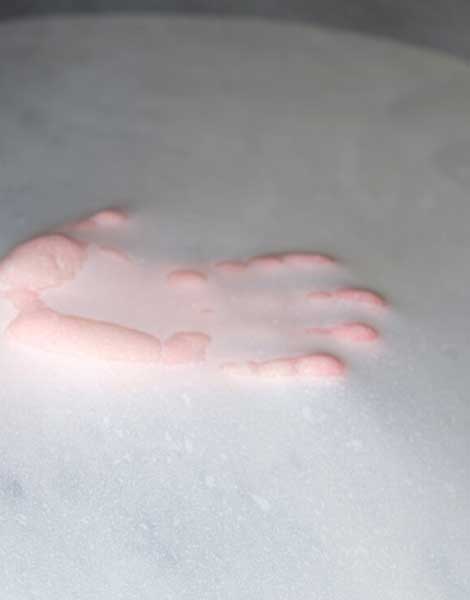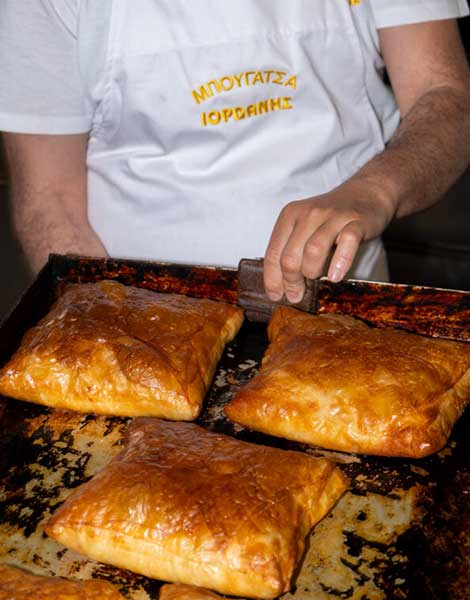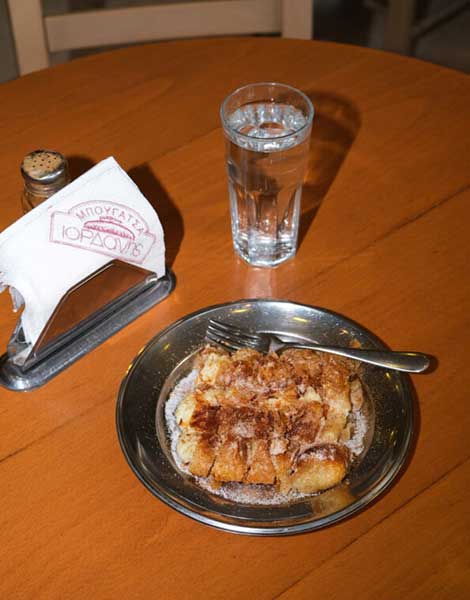The first thing most visitors do upon arriving in Hania, Crete, is head to Iordanis. While bougatsa can be enjoyed at any time of day, it’s especially delightful at dawn, when the ferry from Piraeus docks. Fresh from the oven and served with a glass of cool water, it’s the hearty breakfast you need to kickstart your day or summer vacation. Distinguished by its century-long tradition, this bougatsa is made with handmade, crispy phyllo dough, a rich and creamy, slightly tangy sheep’s mizithra cheese filling, and the perfect finishing touch: crystal sugar, which adds a delightful crunch to each sweet and savory bite.
Iordanis Akasiadis, the fourth-generation owner, tells the story of this legendary Cretan bougatsa store next to the open workshop, where expert pastry makers toss the dough until it forms a thin, transparent sheet: “My great-grandfather, a baker from Asia Minor, arrived in Hania in 1924. While most immigrants were given land for farming, he bought the business of a Muslim Cretan who owned a bougatsa shop in the old town, using the money he had been allotted. The shop was then passed down to his son-in-law, Iordanis, my grandfather. Iordanis was a shoemaker, known for making beautiful women’s shoes. However, during those tough times, no one was buying shoes, and he had no work. So, when his father-in-law told him, ‘Leave the shoes and come learn the trade,’ he did,” says Iordanis Jr., who joined the family business and followed in his father’s footsteps.

© Effie Paroutsa

© Effie Paroutsa
The recipe for Iordanis’ bougatsa has remained unchanged since the beginning. “Always made with mizithra cheese, also known as pichtogalo, a white, creamy cheese with a thick consistency, a salty and sour flavor, and a milky aftertaste.” There is nothing extra added to the filling. “We blend it a little to make it a smooth cream,” says Iordanis. He proudly states that all of the ingredients are sourced locally: the flour comes from Mills of Crete, the oil from ABEA, Greece’s oldest olive oil company (founded in 1889), and the mizithra cheese from three local dairies: Malefakis (also known for their excellent sheep’s yogurt), Papagiannakis, and the Agricultural Cooperative of Rethymno. “My grandfather used to bake in a wood-fired oven, but that has changed now. He also had a bowl of stakovoutyro (butter made from milk crust), and as soon as the bougatsa came out of the oven, he would brush it on,” he recalls.

© Effie Paroutsa

© Effie Paroutsa
As waiters move trays with tin plates back and forth, we look at the diverse clientele: “We serve people of all ages and walks of life,” says Iordanis’ wife. “I’m proud of the fact that everyone feels welcome here.” Even Aristotle Onassis and his daughter Christina visited the store in the ’60s. The story goes that the Greek millionaire left a tip equal to an average month’s pay, so they must have liked it.
Over the years, Iordanis’ bougatsa has served as both a source of misunderstandings and a vehicle for reconciliation. “Many people arrive on the early morning ferry thinking, ‘I don’t want to wake up my relatives or mother at this hour; I’ll just go for bougatsa first.’ And then the mothers become upset! They say, ‘You went to Iordanis first and then came home?'” Iordanis laughs. “In the past, when there were many card-playing clubs around here, people would finish their games at dawn and come to get bougatsa to appease their wives,” he adds.
This bougatsa has traveled the world, from Canada and China to Alaska. One customs officer, a regular customer, heard it mentioned on the other side of the globe: “During a trip to Panama, his host took him to one of those exotic little islands in the Pacific. There, they met two French people, and the conversation quickly turned to Crete-Hania-Bougatsa Iordanis!”
This article was previously published in Greek at gastronomos.gr.












